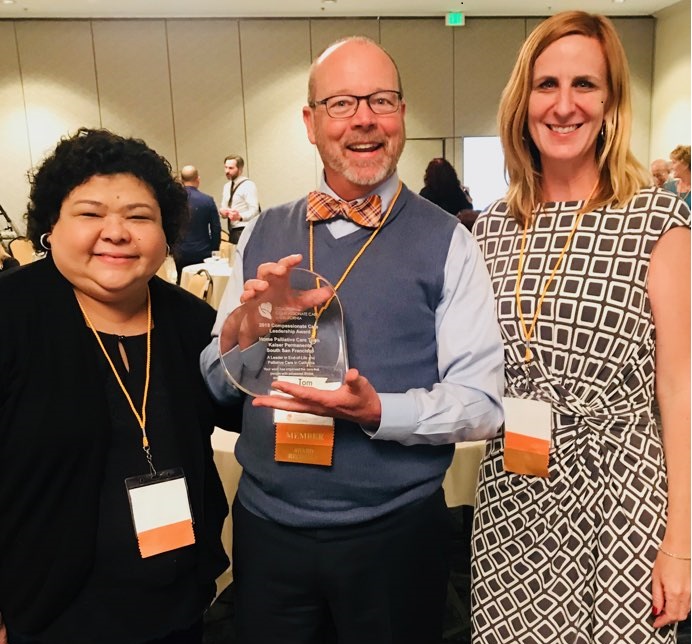South San Francisco, CA April 26, 2018 Submitted by Joe Fragola, PR & Media Relations

The groundbreaking work of Kaiser Permanente South San Francisco’s Home Palliative Care Program has been recognized by the California Coalition for Compassionate Care (CCCC) with the 2018 leadership award. The award is a prestigious honor in the field, given to an organization that has developed innovative programs to improve services for palliative care patients while making significant contributions in advocacy, education and outreach to patients, their family members, and the wider medical community.
“This is first time the team has been recognized with a major award and we’re very excited,” said Tom Grothe, nurse practitioner, one of the program’s founders. Grothe traveled to Anaheim on April 11 with other members of the SSF Palliative care team to accept the award at the organization’s 10th annual Palliative Care Summit.
“The CCCC is a very impressive organization,” added Pam Bohmann, manager, Palliative Care Department. “They’ve been leaders in the state, especially around life care planning and promoting palliative care outside the hospital, so we’re really proud to receive this recognition from them.”
The SSF Home Palliative Care Program has garnered attention for the innovative way it is structured. Whereas most palliative care programs operate on a consultant model, the KPSSF program uses a less common approach. It follows a primary care model that includes nurse practitioners as primary care providers on the home care team.
“We function like a clinic, but in the home,” said Grothe.

Elaine Suguitan Clinical Nurse Specialist, Tom Goethe Nurse Practitioner, Erika Royo, Master of Social Work.
Patients are referred to palliative care when they have a progressive, life-threatening condition such as dementia or heart disease. While 50 percent of the program’s patients are referred during the last year of their life, there are also many who have been in the program for many years.
“Our program meets an unmet need, especially with advanced age homebound patients who really couldn’t access the care they need in a clinic setting,” Bohmann said. “So many of the people we see, especially with advanced dementia, just want to stay home and be cared for in their home, but that’s difficult in a clinic-focused program.”
The program began in 2004 and has now grown to include close to 400 patients. In 2005 the team received an Everyday Heroes award, but this is the first time the program has received community-wide recognition.
In addition to Grothe, the care team consists of two social workers, Lucy Lipkina and Erika Rojo; four additional nurse practitioners: Susan Brennan, Qung Yang, Yvette Chu, and Jennifer Serafin; and a supervising physician, Russ Granich, MD.
Life care planning is an integral part of the program. “A lot of what we do is to educate patients and their families as to what a certain progressive diagnosis means and how to decide the best way to honor their care wishes,” said Grothe.
The result is that in 2017, with an average daily census of almost 400 patients, there were only 90 brief hospitalizations for all Home Palliative Care patients. When patients are ready, the team makes a referral to home hospice with the result that 78 percent of their patients achieve their desire of dying at home.
“We want to acknowledge South San Francisco management for their support in recognizing the importance of this kind of care,” said Grothe. “They are fully behind this program, with both KPH and TPMG coming together to fund it, and we have tremendous support from both physicians and nursing management. That’s why it works so well.”
Bohmann says another benefit of the award is in publicizing the benefits of the primary care model. “One of the main reasons we’re so excited about this award is that we hope it will bring awareness and disseminate these best practices,” Bohmann said. “We hope people will look at our outcomes and see if they can apply the same model within their own setting.”
“It feels good to be part of a statewide community that is working to improve end-of-life and chronic condition care for people in California and to be recognized for doing some innovative work in that field,” said Grothe.